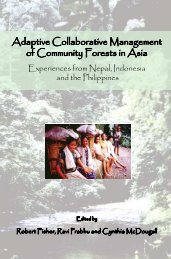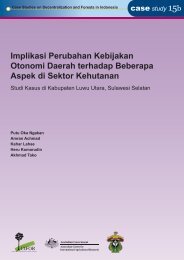Where the power lies: multiple stakeholder politics over natural ...
Where the power lies: multiple stakeholder politics over natural ...
Where the power lies: multiple stakeholder politics over natural ...
Create successful ePaper yourself
Turn your PDF publications into a flip-book with our unique Google optimized e-Paper software.
from a district to sit in Parliament. The councillors and <strong>the</strong> MP are generally viewed as<br />
political ra<strong>the</strong>r than development oriented.<br />
Local communities and villages<br />
These are small units of households under a traditional leader that reside in an area<br />
whose boundaries are known and often contested. This unit is different from an area<br />
referred to as a VIDCO which is an administratively defined and administered by a village<br />
development committee (VIDCO). A VIDCO controls an area comprising numerous<br />
traditional villages under a traditional leader called a ‘kraalhead’. The boundaries of a<br />
VIDCO are even more vehemently contested compared to <strong>the</strong> village boundaries as <strong>the</strong>y<br />
bear no relation to functional systems of organization or how <strong>the</strong> people prefer to be<br />
organized. In general local people ignore <strong>the</strong>se boundaries.<br />
The villages in and around Mafungautsi State Forest are ethnically diverse. Three main<br />
groups are identified: <strong>the</strong> Shona, <strong>the</strong> Ndebele and <strong>the</strong> Shangwe. The Shangwe have<br />
resided in <strong>the</strong> area <strong>the</strong> longest and speak a Shona dialect though <strong>the</strong>y communicate<br />
publicly in Ndebele. They often identify <strong>the</strong>mselves with <strong>the</strong> Ndebele, giving <strong>the</strong><br />
appearance of a dominant Ndebele group. Within <strong>the</strong> study area, <strong>the</strong> Shangwe are regarded<br />
as backward and ignorant. They account for higher figures of illiteracy in <strong>the</strong> area and<br />
are sometimes involved in hunter-ga<strong>the</strong>rer activities. There are o<strong>the</strong>r groups like <strong>the</strong><br />
Tonga, but <strong>the</strong>ir numbers are small compared to <strong>the</strong> main groups. More recent migrants,<br />
whe<strong>the</strong>r Shona or Ndebele, often are described as separate from <strong>the</strong> longer-term resident<br />
groups and tend to be ignored and left out of projects in <strong>the</strong> area. There are a number of<br />
leadership disputes among different individuals from <strong>the</strong> ruling households. These disputes<br />
tend to result in <strong>the</strong> reconstitution of communities where leaders may assimilate migrants<br />
in order to gain more support. Among <strong>the</strong>se ethnic groups, Shona women tend to participate<br />
more in public meetings while <strong>the</strong> Shangwe and <strong>the</strong> Ndebele are not as forthcoming.<br />
Researchers cite cultural restrictions as reason for limited participation by women. Fur<strong>the</strong>r<br />
user groups are not always constituted by local people. Some of <strong>the</strong> people in and around<br />
<strong>the</strong> forest were evicted in <strong>the</strong> 1980s. Different groups prefer different land uses for <strong>the</strong><br />
forest. People evicted from <strong>the</strong> forest would like <strong>the</strong> forest to be converted to agricultural<br />
land. Some of <strong>the</strong> o<strong>the</strong>r users are seasonal users from o<strong>the</strong>r villages close by and from<br />
areas far from <strong>the</strong> forest who come to harvest particular resources.<br />
The g<strong>over</strong>nment<br />
This is defined as something bigger and more influential than <strong>the</strong> local representatives<br />
of <strong>the</strong> different departments of g<strong>over</strong>nment in <strong>the</strong> area. It is also not separate from <strong>the</strong><br />
ZANU PF political party. Thus respondents were often referring to “<strong>the</strong> g<strong>over</strong>nment” as<br />
ignoring <strong>the</strong>m, forgetting <strong>the</strong>m or exploiting <strong>the</strong>m. Views were also expressed about<br />
support for <strong>the</strong> g<strong>over</strong>nment or lack <strong>the</strong>reof because of failed projects, misdirected<br />
resources or <strong>the</strong> plunder of resources by public officials while restricting access by<br />
local people. There is no clear distinction made between <strong>the</strong> g<strong>over</strong>nment and <strong>the</strong><br />
ruling political party.<br />
Traditional leadership structures<br />
Traditional institutions exist but tend to be replaced by elected committees in development<br />
projects. Most local respondents stated that <strong>the</strong>y prefer to work through <strong>the</strong> traditional<br />
institutions. In a comparison of institutions using ranking, traditional institutions were<br />
picked out each time as <strong>the</strong> organization people would be most happy to work though.<br />
However, some respondents who are migrants were sceptical of <strong>the</strong> capacity of <strong>the</strong>se<br />
traditional institutions. Migrants also indicated that some of <strong>the</strong> traditional leaders ignore<br />
<strong>the</strong> needs of migrants. But one traditional leader argued that only those migrants whose<br />
10

















